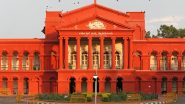Guwahati, Nov 19 (PTI) A tusker was radio-collared in Assam's Baksa district as part of an initiative led by the state forest department with support from the district administration and police, officials said.
The elephant was tranquilised by a team of veterinarians with the help of forest officials and biologists under the leadership of Field Director of Manas Tiger Reserve Dr C Ramesh and supervision of Baksa Divisional Forest Officer (DFO) Golap Baniya at Jartaluk area of the district on Monday, they said.
The elephant later joined its herd, according to a release issued on Tuesday.
"I had led a team of veterinarians from Assam State Zoo who supported the team with necessary veterinary support to capture and radio collar the elephant. We have supported the team with required medicines, tranquillizing guns and related items to make the radio collaring successful which will help in tracking elephant movement to better manage human-elephant conflict in the region", said Assam State Zoo's DFP Ashwini Kumar,
The basic objective of radio collaring of wild elephants is to determine the elephant occupancy within an area or range. It helps in better management of human-elephant conflict and facilitate elephant conservation.
The team for capturing and radio-collaring of the elephant also consisted of wildlife biologists, researchers, Green Globe, WWF India and local stakeholders.
GPS-based satellite-radio telemetry collar which was fitted to the elephant will help to assess the migratory pattern, vegetative preferences of the wild elephant and the herd it belongs to. The locations provided by the collar will also act as an early alert system to help in better management of human-elephant conflict in the landscape, said DFO Baksa Forest Division Golap Baniya.
"The radio collaring of wild elephant will help understand ecology, habitat utilisation pattern, movement and occupancy in a more scientific way and help come out with better elephant conservation strategy in the landscape", Aaranyak's head of Elephant Research and Conservation Division (ERCD) Dr Bibhuti Prasad Lahkar said.
(This is an unedited and auto-generated story from Syndicated News feed, LatestLY Staff may not have modified or edited the content body)













 Quickly
Quickly

















